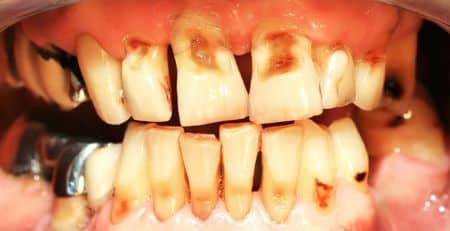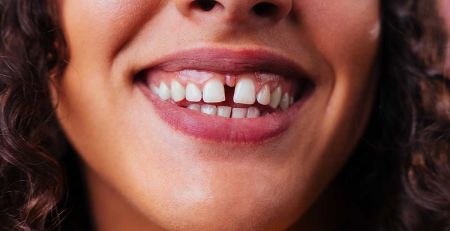Table of Contents
Eating disorders such as bulimia nervosa and anorexia nervosa are complex mental health conditions affecting millions worldwide.
While these disorders’ physical and psychological consequences are widely recognised, their detrimental impact on oral health is often overlooked.
How do eating disorders such as anorexia affect oral health?

Anorexia is a severe eating disorder characterised by restrictive eating patterns and an intense fear of gaining weight. While the physical and psychological consequences of anorexia are well-known, its effects on oral health are often overlooked.
This article aims to provide a detailed overview of how anorexia can impact oral health based on clinical references and research studies.
Tooth Erosion and Enamel Damage
A prominent consequence of anorexia is the lack of proper nutrition, including calcium and other essential minerals. This deficiency weakens tooth enamel, making teeth more susceptible to erosion.
Frequent vomiting, sometimes induced to control weight, exposes teeth to stomach acids, leading to enamel erosion and increased tooth sensitivity.
Dry Mouth (Xerostomia):
Dehydration from restricted fluid intake can reduce saliva production, causing dry mouth.
Saliva is crucial in neutralising acids, remineralising teeth, and maintaining oral health.
Insufficient saliva flow increases the risk of tooth decay and oral infections.
Gum Disease (Gingivitis and Periodontitis)
Anorexia compromises the immune system, making individuals more susceptible to gum disease.
Poor nutrition and vitamin deficiencies associated with anorexia can lead to gum inflammation, bleeding, and potential tooth loss.
Dental Cavities
Irregular eating patterns, reduced food intake, and a lack of proper oral hygiene can increase the risk of dental cavities.
The mouth becomes more acidic due to reduced saliva flow, creating an environment conducive to tooth decay.
Oral Soft Tissue Problems
Nutritional deficiencies associated with anorexia can result in oral soft tissue problems, such as dry and cracked lips, oral sores, and delayed wound healing.
Anorexia nervosa can have severe consequences for oral health, including tooth erosion, enamel damage, dry mouth, gum disease, dental cavities, and oral soft tissue problems.
It is crucial to recognise these risks and seek appropriate dental care as part of the comprehensive treatment approach for anorexia.
What does Bulimia do to your teeth, and does repeated vomiting cause dental problems?
Bulimia is an eating disorder characterised by recurrent episodes of binge eating followed by compensatory behaviours such as self-induced vomiting, excessive exercise, or the misuse of laxatives.
Dental Erosion Damaging Tooth Enamel
Frequent vomiting exposes teeth to stomach acid, leading to enamel erosion and weakening of tooth structure.
Enamel erosion can result in tooth sensitivity, increased susceptibility to cavities, and aesthetic changes, such as tooth discolouration and changes in tooth shape and size.
Tooth Cavities
Binge eating episodes often involve consuming sugary and acidic foods, which can promote tooth decay.
The combination of frequent vomiting and poor oral hygiene practices exacerbates the risk of dental cavities.
Sensitive Teeth and Tooth Sensitivity
Enamel erosion from recurrent vomiting can lead to tooth sensitivity, which can result in discomfort or pain when consuming hot, cold, sweet, or acidic foods and beverages.
Worn enamel exposes dentin, a sensitive layer of the tooth, which can lead to heightened sensitivity.
Swollen Salivary Glands
Bulimia-related behaviours, such as self-induced vomiting, can cause swelling and inflammation of the salivary glands, particularly the parotid glands.
Swollen salivary glands can be painful and contribute to dry mouth, difficulty swallowing, and an increased risk of oral infections.
Oral Trauma
Self-induced vomiting can cause trauma to the mouth’s soft tissues, including the palate, causing irritation, scratches, and potential bleeding.
Repeated trauma from the fingers or objects used during purging can lead to chronic damage to the oral tissues.
Bulimia nervosa can have severe consequences for teeth and oral health, including tooth erosion, dental cavities, tooth sensitivity, swollen salivary glands, and oral trauma.
Recognising and addressing these risks is crucial for individuals affected by bulimia.
Seeking Professional Help
If you or someone you know is struggling with an eating disorder, we strongly encourage you to contact healthcare professionals or specialised organisations for guidance and support.
Eating disorders require comprehensive treatment that addresses both physical and mental health aspects.
You are not alone, and support is available to help you on the path to recovery.
The Queensland Government supports and assists individuals seeking help for themselves or their loved ones struggling with eating disorders. The Queensland Eating Disorder Service (QuEDS) provides specialised services and resources to support individuals on their journey to recovery.
To access these services and learn more about the available support, please visit the Queensland Government’s official website at https://www.qld.gov.au/health/services/specialists/queensland-eating-disorder-service-queds.
Together, we can prioritise your oral health and well-being, ensuring that your journey towards recovery includes comprehensive dental care. Contact our team at Amazing Smiles to receive the compassionate and understanding support you deserve for your oral health needs.
At Amazing Smiles, our experienced dentists understand the sensitive nature of dental problems caused by eating disorders. We provide a safe and supportive environment for patients seeking dental care.
Our team ensures utmost respect, confidentiality, and empathy throughout treatment. We are here to offer personalised solutions to restore dental health. Additional professional service providers in Queensland include:
- https://butterfly.org.au/
- https://insideoutinstitute.org.au/support-organisations/eating-disorders-queensland-edq
- https://eatingdisorderscarerhelpkit.com.au/
- https://www.qmhc.qld.gov.au/media-events/news/national-eating-disorder-strategy
References:
-
- Kaye WH et al. (1991). Tooth erosion in bulimia nervosa: clinical and electron microscopic findings.
- Delli K et al. (2017). Xerostomia in Eating Disorders: A Critical Review.
- Scheidt M et al. (2009). Oral health in women with eating disorders.
- Ulimoen GR et al. (2008). Dental conditions in patients with anorexia nervosa: A case–control study.
- Grushka M et al. (1987). Orofacial findings in patients with eating disorders.
- Togoo RA et al. (2017). Dental Erosion in Bulimic Patients: A Systematic Review and Meta-Analysis.
- Milosevic A et al. (1997). Dental erosion and associations with diet in Scottish preschool children.
- Cheng R et al. (2012). Dental Erosion and its Association with Diet in Chinese Adults.
- Neville BW et al. (2019). Bulimia nervosa. In: Neville BW, Damm DD, Allen CM, Chi AC (eds). Oral and Maxillofacial Pathology (4th ed.).
- Silverstone LM et al. (1982). The Prevalence of Bulimia in a Random Sample of Female Students.
Disclaimer:
The information provided in this article is for educational purposes only and should not replace professional medical or dental advice. It is essential to consult with a qualified healthcare professional, therapist, or dentist for an accurate diagnosis, advice, and treatment. Amazing Smiles recommends that individuals who suspect they have an eating disorder seek professional help promptly. Remember, self-diagnosis and self-treatment can be dangerous and may delay appropriate care.





